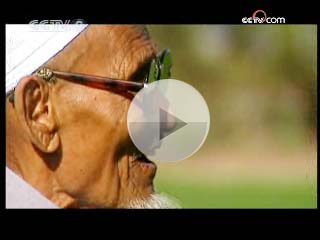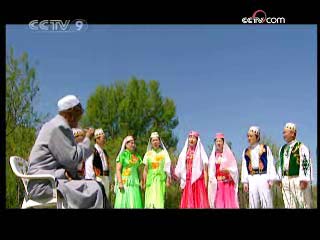------Program code: DO-080825-00700 (what's this?)
Source: CCTV.com
08-25-2008 08:43
In a remote village in Xinjiang, live an elderly couple who are supporting each other in their twilight years. One of them is 86 and blind; the other is deaf and dumb.
 |
Han Shengyuan has never attended school and is illiterate. Yet, he is famous. In the course of his lifetime he has composed over a thousand songs in the traditional Huar style. As a singer and composer, he is known as a living fossil of Huar songs. He has even recorded an album.
 |
Midong New District is part of Changji Hui Autonomous Prefecture in Xinjiang Uygur Autonomous Region. Early this morning, the Huar Art Troupe will perform in the town of Changshanzi, where Han Shengyuan lives. His wife dresses him in new clothes for the occasion. As the acknowledged king of Huar, he will be performing.
Huar is a traditional folk music of the Hui Nationality, in which the songs are improvised. Huar is popular in the Ningxia, Gansu and Qinghai regions. Han Shengyuan’s father brought traditional Huar music with him when he came to Xinjiang from Qinghai. Han Shengyuan’s parents both died when he was 7. He was left to fend for himself, until he met a Huar folk artist called Mr Ma, who made him his apprentice.
Mr Ma taught Han everything he knew, and by the time he was 18, he could not only sing traditional Huar but also compose Huar songs. Before long, he was a famous figure locally.
Han Shengyuan is the key member of the local Huar Troupe, most of whose members have been his students. Over the decades, he has taught numerous students, as a way of keeping the art alive. Whenever he performs in Changshanzi, people come from near and far to listen. Changji Hui Autonomous Prefecture, with a Hui population of 170,000, is traditionally known as the home of Huar.
At the beginning of the 18th century, the Qing government started promoting land cultivation around the Tianshan Mountains in Xinjiang, as a way of creating stability on the border. This brought floods of new residents from the hinterland into the area, among them many Hui people. They brought with them their traditional art – Huar.
The Huar in Xinjiang today retains much of its original style. But there are some songs that have evolved and assumed a new form. These are known as Xinjiang Huar.
Han Shengyuan excels as a performer of various forms of traditional Huar. His songs, which reflect everyday life and cover a rich variety of subjects, are sung to many different tunes. For this, his songs are loved by the villagers of Changshanzi.
Han Shengyuan can also sing the songs of many other nationalities. He has even cultivated his own style by incorporating into his Huar musical elements from other nationalities, such as Uygur and Kazak.
Han Shengyuan has lost count of all the songs he has sung, since he started performing at the age of 7. Besides traditional Huar, he has also composed many new songs that express his own feelings.
Han Shengyuan’s performances are always greeted enthusiastically by Huar fans. He can’t see the eyes shining with admiration, but he can sense the warmth and their love of Huar. It’s this that has kept him performing for so many decades.
Whenever he returns home from a performance, it’s as if he has not sung enough. So he stops to relax in the yard.
20 years ago, an accident during an operation resulted in the gradual loss of his eyesight. But it never discouraged him from composing Huar.
Although he lives in physical darkness, the Huar melodies bring light into his spiritual world.
He is happy, despite his blindness. He has five children, all of whom live in the small village. After every performance, the children make Latiaozi, a kind of Xinjiang noodle, for him and invite him to their homes. Such occasions are the happiest time for the family.
But as a youth, Han Shengyuan experienced the pain of lost love.
Through that song, the young Han Shengyuan got to know a girl, and he fell in love with her. However, she came from a rich family, and their romance was opposed by her family.
